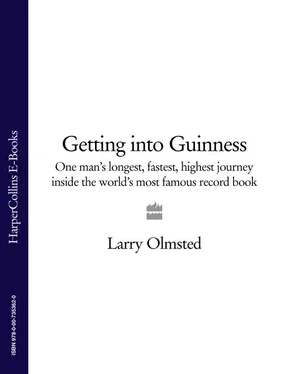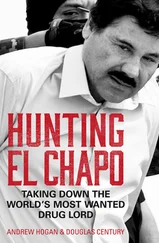One Man’s Longest, Fastest, Highest Journey Inside The World’s Most Famous Record Book

Adrian Hilton recited the Complete Works of Shakespeare nonstop, going five days without sleep to earn his Guinness recognition. At a difficult point in his life, Hilton said a friend told him: “Adrian, if you give up now, you weren’t made of the right stuff in the first place.”
INVESTOR’S BUSINESS DAILY , 30 MARCH, 2007
Cover Page
Title Page Getting Into Guinness One Man’s Longest, Fastest, Highest Journey Inside The World’s Most Famous Record Book
Epigraph Adrian Hilton recited the Complete Works of Shakespeare nonstop, going five days without sleep to earn his Guinness recognition. At a difficult point in his life, Hilton said a friend told him: “Adrian, if you give up now, you weren’t made of the right stuff in the first place.” INVESTOR’S BUSINESS DAILY , 30 MARCH, 2007
Authors Note
Introduction
1 Meet Ashrita, Record Breaker for God
2 The Greatest Record of All: Birds, Beaver, Beer and Sir Hugh’s Impossible Question
3 Getting into Guinness Gets Personal
4 Guinnessport: Getting into Guinness Goes Prime Time
5 15 Minutes of Fame
6 72 Hours in Hell: Getting Back into Guinness
7 The Cheese Does Not Stand Alone: Giant Food and Guinness
8 Records Go Global
9 The Dark Side: Guinness Records Gone Bad
Epilogue
Appendix 1
Appendix 2
Appendix 3
Appendix 4
Endnotes
Index
Acknowledgements
Copyright
About the Publisher
Guinness World Records is the current name of the book that has become the biggest international best seller of all time, and it is published by Guinness World Records Ltd, a London-based company. However, both the book’s title and ownership have changed several times throughout its history, so to make things less confusing, I offer the following brief explanation.
The book was originally titled The Guinness Book of Records and published in 1955 by Superlatives Ltd, a wholly owned subsidiary of Arthur Guinness & Sons, the huge brewing company that also made Guinness Stout. Superlatives Ltd later became known as Guinness Publishing, and its parent company as Guinness plc. Guinness plc is now part of multinational beer, wine and spirits conglomerate Diageo plc. In 1999 Guinness Publishing changed to its current name, Guinness World Records Ltd, but has also been sold and resold and is no longer associated in any way with the brewery or with Diageo, except for the common use of the word ‘Guinness’ in beer and book.
When first released in the United States, the book was briefly titled The Guinness Book of Superlatives, then quickly repackaged in a cover titled Superlatives Book of World Records , and soon became The Guinness Book of Records once again, and then The Guinness Book of World Records , which I believe is its best known and most widely used title, and what many fans still call it today. To further confuse matters, for more than 20 years the US version was produced and distributed under licence by Sterling Publishing in New York, but now it is fully owned and produced by Guinness World Records Ltd. In general, the US and UK editions will be referred to interchangeably throughout this work, though there were often minor differences between the two even in the same years, and some records were recognized only by one or the other version.
Throughout this book I use the original title, The Guinness Book of Records , the current title, Guinness World Records, and the in-between title, The Guinness Book of World Records. In addition, I use the simpler terms ‘Guinness book’, ‘book of records’ and even ‘The Book’ when referring to the same work. Likewise, in describing the records themselves (each officially called by the plural ‘Guinness World Records’), I variously referred to them as Guinness Records, Guinness World Records, records, world records, the Guinness World Record, while identifying the record holders as record holders, world record holders, and Guinness World Record holders, among other possible descriptions.
Since the company, its book, and its records now have virtually the same name, I will italicize Guinness World Records when referring to the book and leave Guinness World Records unadorned when referring to either the records themselves or the company and its editors, staffers, policies and other products. Similarly, the book’s original creator is variously referred to as Arthur Guinness & Sons, Guinness plc, and simply Guinness, as well as ‘the brewing company’.
Finally, the expressions ‘Getting into Guinness’, ‘Get into Guinness’ or variations thereof always refer to an attempt to break or set a record in a manner recognized by Guinness World Records Ltd and its book Guinness World Records , with the intention of obtaining an official certificate and/or being published in the pages of the book or listed in the company’s record database. These terms do not refer to the literal notion of getting into a beverage brewed by the company that makes Guinness Stout. While there is no longer any association between the brewer and the book, I would like to add that the stout is still excellent after all these years, and several were consumed by me, at my desk, in the writing of this work.
In my research for Getting into Guinness, I reviewed countless published sources about the origins and development of Guinness World Records and interviewed many of the more astounding Guinness World Record holders. Combining this research with my own experiences as a fan since reading it as a child, and as the holder of two records, I have attempted to recount the enthralling 50-year history of the Guinness World Records from the perspective of the record holder (or aspiring record holder) looking into a company that has fascinated him from a young age. As such, this book is not an official history of Guinness World Records, nor has it been sponsored, endorsed, authorized, or in any way supported by Guinness World Records. Indeed, Guinness World Records may at some point elect to publish such a book, and, with its extensive archives, I am sure that it would be fascinating.
LSO, November 2007
Конец ознакомительного фрагмента.
Текст предоставлен ООО «ЛитРес».
Прочитайте эту книгу целиком, купив полную легальную версию на ЛитРес.
Безопасно оплатить книгу можно банковской картой Visa, MasterCard, Maestro, со счета мобильного телефона, с платежного терминала, в салоне МТС или Связной, через PayPal, WebMoney, Яндекс.Деньги, QIWI Кошелек, бонусными картами или другим удобным Вам способом.













